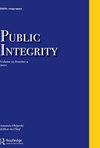Black Lives Experiencing Homelessness Matter: A Critical Conceptual Framework for Understanding How Policing Drives System Avoidance among Vulnerable Populations
IF 1.3
Q3 PUBLIC ADMINISTRATION
引用次数: 0
Abstract
Abstract This paper examines racialized encounters with the police from the perspectives of people experiencing homelessness in San Diego, California in 2020. By some estimates, homelessness doubled in San Diego during the first year of the COVID-19 pandemic. We conducted a survey of (n = 244) and interviews with (n = 57) homeless San Diegans during initial shelter-in-place orders, oversampling for Black respondents, whose voices are often under-represented despite high rates of homelessness nationally. Our respondents reported high rates of police contact, frequent lack of respect; overt racism, sexism, and homophobia; and a failure to offer basic services during these encounters. Centering our Black respondents’ experiences of criminalization and racism in what Clair calls “criminalized subjectivity,” we develop a conceptual framework that brings together critical theoretical perspectives on the role of race in the governance of poverty and crime. When people experiencing extreme poverty face apathy, disrespect, and discrimination from police—as our data show—the result is a reluctance to seek services and to engage with outreach when offered. This reinforces stereotypes of unhoused people as not “wanting” help or “choosing” to be homeless. We reflect on these findings and our framework for envisioning a system of public safety that supports and cares for—rather than punishes—the most vulnerable members of our society.经历无家可归的黑人生活很重要:理解警察如何在弱势群体中推动系统回避的关键概念框架
摘要本文从2020年加州圣地亚哥无家可归者的角度审视了与警察的种族化遭遇。据估计,在新冠肺炎大流行的第一年,圣地亚哥的无家可归者人数翻了一番。我们对(n = 244)和对(n = 57)无家可归的圣迪根人在最初的避难所订单期间,对黑人受访者进行了过度抽样,尽管全国无家可归率很高,但他们的声音往往代表性不足。我们的受访者报告说,警察接触率很高,经常缺乏尊重;公开的种族主义、性别歧视和恐同症;以及在这些遭遇中未能提供基本服务。以我们黑人受访者的刑事定罪和种族主义经历为中心,克莱尔称之为“刑事定罪的主观性”,我们制定了一个概念框架,将种族在治理贫困和犯罪中的作用的批判性理论观点结合在一起。正如我们的数据所示,当经历极端贫困的人面临警察的冷漠、不尊重和歧视时,结果是不愿寻求服务,也不愿在提供服务时参与外联活动。这强化了人们对无家可归者的刻板印象,认为他们不“想要”帮助或“选择”无家可归。我们反思这些发现,以及我们设想一个支持和照顾——而不是惩罚——我们社会中最弱势成员的公共安全体系的框架。
本文章由计算机程序翻译,如有差异,请以英文原文为准。
求助全文
约1分钟内获得全文
求助全文

 求助内容:
求助内容: 应助结果提醒方式:
应助结果提醒方式:


